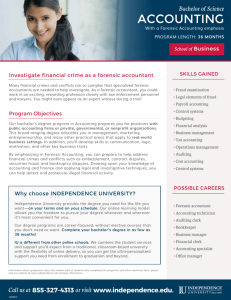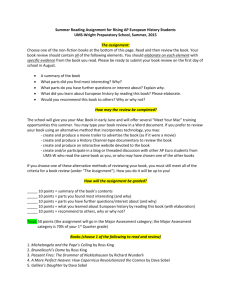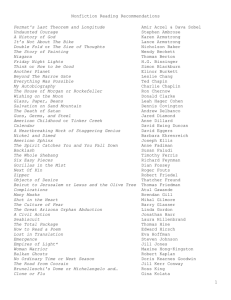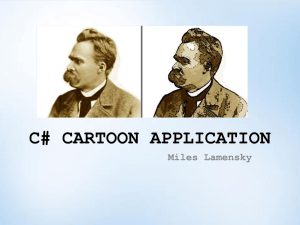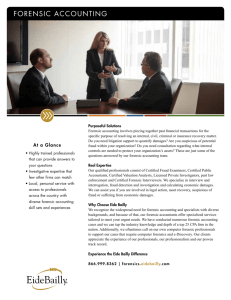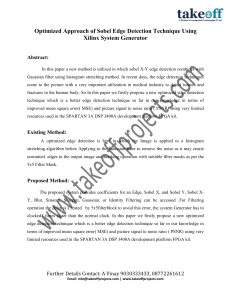CPA Firm Offers Advice to Anti-fraud Students
advertisement
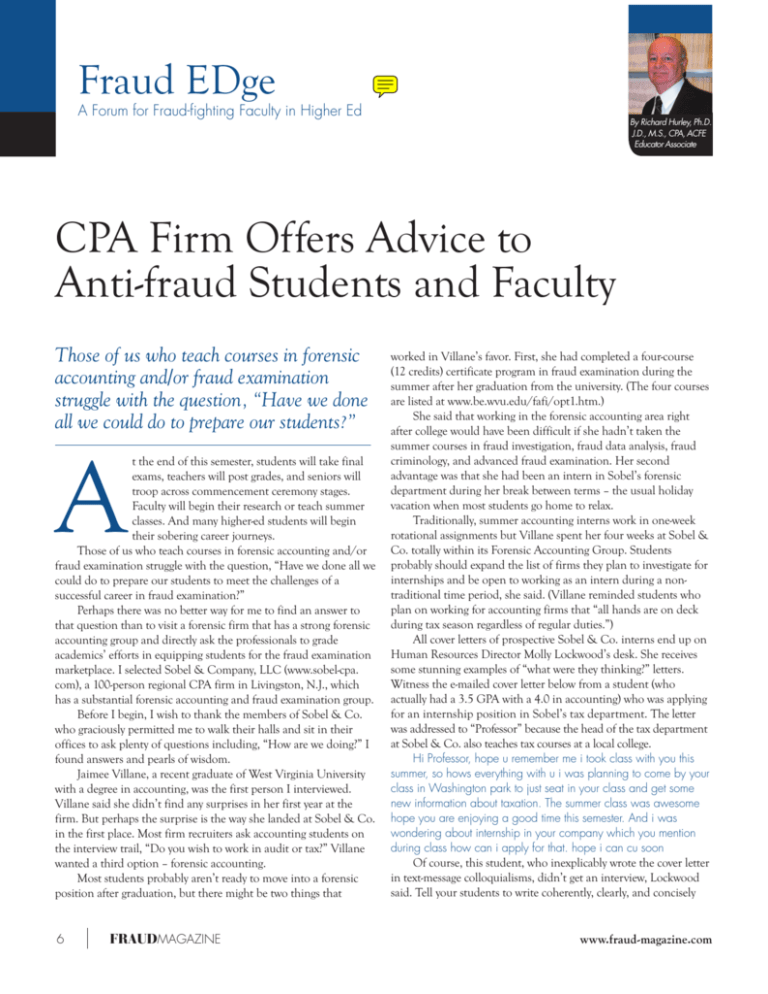
Fraud EDge A Forum for Fraud-fighting Faculty in Higher Ed By Richard Hurley, Ph.D. J.D., M.S., CPA, ACFE Educator Associate CPA Firm Offers Advice to Anti-fraud Students and Faculty Those of us who teach courses in forensic accounting and/or fraud examination struggle with the question, “Have we done all we could do to prepare our students?” A t the end of this semester, students will take final exams, teachers will post grades, and seniors will troop across commencement ceremony stages. Faculty will begin their research or teach summer classes. And many higher-ed students will begin their sobering career journeys. Those of us who teach courses in forensic accounting and/or fraud examination struggle with the question, “Have we done all we could do to prepare our students to meet the challenges of a successful career in fraud examination?” Perhaps there was no better way for me to find an answer to that question than to visit a forensic firm that has a strong forensic accounting group and directly ask the professionals to grade academics’ efforts in equipping students for the fraud examination marketplace. I selected Sobel & Company, LLC (www.sobel-cpa. com), a 100-person regional CPA firm in Livingston, N.J., which has a substantial forensic accounting and fraud examination group. Before I begin, I wish to thank the members of Sobel & Co. who graciously permitted me to walk their halls and sit in their offices to ask plenty of questions including, “How are we doing?” I found answers and pearls of wisdom. Jaimee Villane, a recent graduate of West Virginia University with a degree in accounting, was the first person I interviewed. Villane said she didn’t find any surprises in her first year at the firm. But perhaps the surprise is the way she landed at Sobel & Co. in the first place. Most firm recruiters ask accounting students on the interview trail, “Do you wish to work in audit or tax?” Villane wanted a third option – forensic accounting. Most students probably aren’t ready to move into a forensic position after graduation, but there might be two things that FRAUDMAGAZINE worked in Villane’s favor. First, she had completed a four-course (12 credits) certificate program in fraud examination during the summer after her graduation from the university. (The four courses are listed at www.be.wvu.edu/fafi/opt1.htm.) She said that working in the forensic accounting area right after college would have been difficult if she hadn’t taken the summer courses in fraud investigation, fraud data analysis, fraud criminology, and advanced fraud examination. Her second advantage was that she had been an intern in Sobel’s forensic department during her break between terms – the usual holiday vacation when most students go home to relax. Traditionally, summer accounting interns work in one-week rotational assignments but Villane spent her four weeks at Sobel & Co. totally within its Forensic Accounting Group. Students probably should expand the list of firms they plan to investigate for internships and be open to working as an intern during a nontraditional time period, she said. (Villane reminded students who plan on working for accounting firms that “all hands are on deck during tax season regardless of regular duties.”) All cover letters of prospective Sobel & Co. interns end up on Human Resources Director Molly Lockwood’s desk. She receives some stunning examples of “what were they thinking?” letters. Witness the e-mailed cover letter below from a student (who actually had a 3.5 GPA with a 4.0 in accounting) who was applying for an internship position in Sobel’s tax department. The letter was addressed to “Professor” because the head of the tax department at Sobel & Co. also teaches tax courses at a local college. Hi Professor, hope u remember me i took class with you this summer, so hows everything with u i was planning to come by your class in Washington park to just seat in your class and get some new information about taxation. The summer class was awesome hope you are enjoying a good time this semester. And i was wondering about internship in your company which you mention during class how can i apply for that. hope i can cu soon Of course, this student, who inexplicably wrote the cover letter in text-message colloquialisms, didn’t get an interview, Lockwood said. Tell your students to write coherently, clearly, and concisely www.fraud-magazine.com Fraud EDge A Forum for Fraud-fighting Faculty in Higher Ed and drop the text-messaging graffiti habit. Correct spelling and punctuation also are essential. Beyond the traditional GPA requirements (my research tells me 3.0 to 3.2 GPA is a minimum), appropriate major, and caliber of school, Lockwood looks for students who are members of campus clubs, state accounting societies, the ACFE, or local ACFE chapters. She said student internships in accounting and/or fraud examination also are strong factors. Students probably have asked you this question a hundred times: “What elective courses should I take?” Students who avoid challenging electives might also find that employers are avoiding them. Lockwood recommends courses in communication, computer technology, criminology, economics, foreign languages (Chinese, French, German, and Spanish), fraud examination, statistics, and writing. She said students should also take courses that require group efforts so they’ll have some experience before they begin working with a team of diverse fraud examiners. Tell your students they’ll have to work on concurrent projects that management will review weekly. Lockwood said the firm’s salary structure was well within the range of the big four accounting firms, and new employees can go home at a decent hour. (Students shouldn’t shy away from applying to regional firms, she said.) She said students should be prepared to respond when an interviewer asks, “Do you have any questions?” Forensic accountants and fraud examiners should always ask questions. Alan Sobel, managing partner at Sobel & Co., wants his employees to be able to think. Students should possess the ability and drive to probe deeply for root causes of events, he said. Using facts to solve a mystery and words to explain the events of the past are traits that students born during the sound-bite era lack. “Prepare students to think beyond the obvious,” Sobel said. That means avoid multiple-choice questions and include case and report-writing assignments, and class presentations in curriculums. Sobel & Co. follows the traditional CPA firm mindset; employees are advised to sit for the CPA test first and then the CFE exam, according to Daryl Neier, partner in charge of the Forensic Accounting Group. Perhaps the reason for pushing the CPA exam first is so our former students might immediately begin the audit employment track to gain the necessary experience to earn a state CPA license. Sobel & Co. assists employees financially and allows them some time to sit for CPA review classes. Employees receive pay bonuses after they receive their CPAs. CFE exams and subsequent credentialing are necessary for fraud examiners or fraud investigators at Sobel & Co. Employees are allowed to use some of the yearly mandatory 40 hours of CPE to obtain the January/February 2010 CFE credential, Neier said. Of course, your students’ learning doesn’t end with their college diplomas. Professionals have a different word for transferring knowledge from one person to a group: training. Thomas Jobes, a former FBI agent, is a senior manager in Sobel’s Forensic Accounting Group. Jobes said students’ writing skills – the art of putting pen to paper (“finger to keyboard” for the current generation) – are deficient. They need to write well-constructed, well-conceived, understandable, and meaningful sentences. Tell your students that fraud investigators, law enforcement agents, and CFEs must write with precision and tightness. Senior managers at Sobel constantly review employees’ reports not just for content but communication, he said. They also readily use the “track changes” feature in Microsoft Word to make edits and comments. Jobes said new employees often find it difficult to be good fraud examiners right out of college. For example, students need life experiences to conduct good interviews. He said they can learn about financial accounting in classrooms, but forensic accounting requires interpersonal skills and training sessions apart from college. Jobes suggested that faculty record videos of students practicing their interviewing skills. Members of Sobel’s Forensic Accounting Group asked me to thoroughly prepare my students for trials, depositions, crossexaminations, and attacks on their creditability. They stressed that attorneys will use whatever students post on Facebook or Twitter or broadcast on YouTube to discredit them as expert witnesses. The old habit of preparing for a Tuesday morning final exam after the Monday night football game doesn’t make it in the real world. With that attitude, students will fail the workplace’s “Forensics 101,” and you, as their former coaches, inadvertantly might have helped give them low grades. The professionals at Sobel & Company were gracious not to render a grade to anti-fraud and forensic accounting faculty, but they did give me a chance to earn some extra credit for all of us! A special thank you to Darryl Neier for hosting my visit and for arranging the firm members’ interviews. In addition to the individuals mentioned here, I also interviewed George Wade, director of computer forensics, and Richard Barry, director of securities litigation. The firm has some interesting engagements including forensic accounting work on the Patriotic Towers project in New York City (the site of the former World Trade Center). Richard Hurley, Ph.D., J.D., M.S., CPA, ACFE Educator Associate Member, is an associate professor in the University of Connecticut (Stamford) School of Business. His e-mail address is: rhurley@business.uconn.edu. FRAUDMAGAZINE

